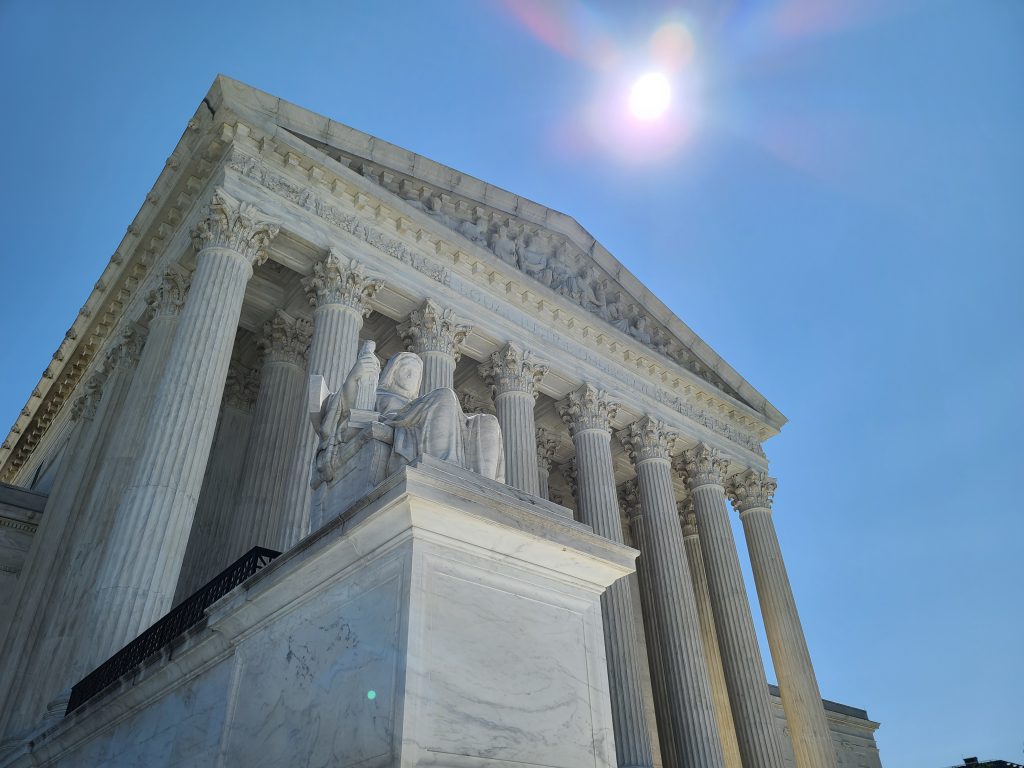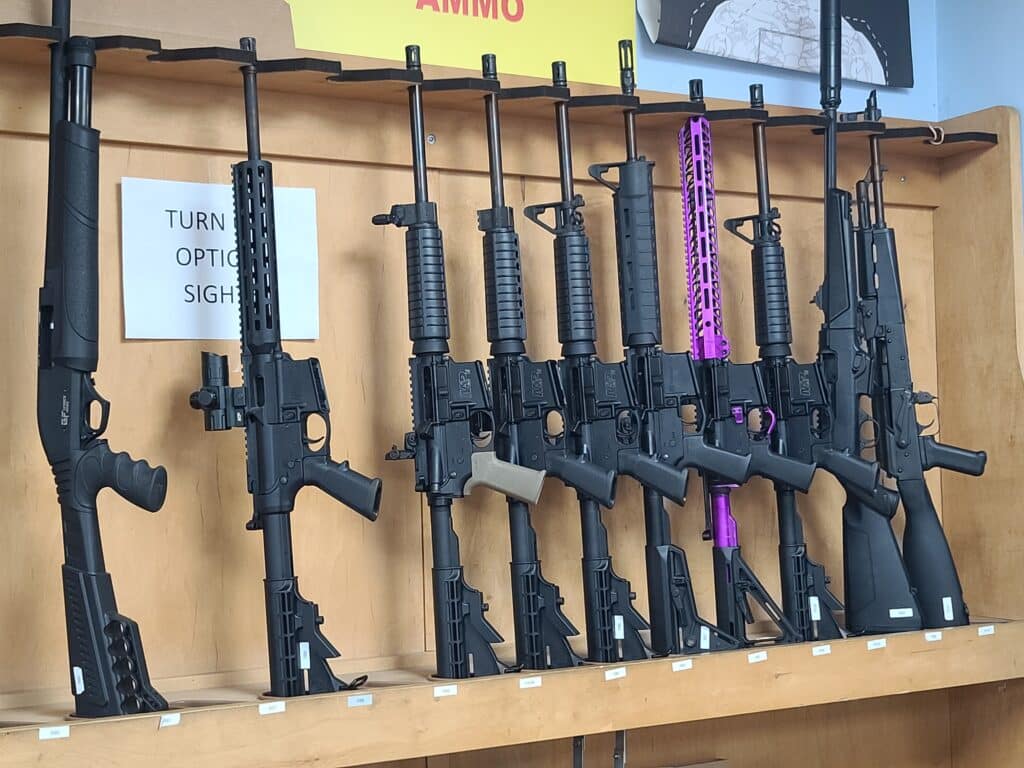Gun-control advocates are not about to give up their fight to protect strict modern gun laws. Now, they have their first significant win in the post-Bruen landscape.
Just as an Obama appointee delivered the first federal court win for gun-rights advocates after the Supreme Court handed down a new standard of review for Second Amendment cases, an Obama appointee has now delivered the first win for gun-control advocates. A Colorado town’s “assault weapons” ban was on the losing end late last month, and a California city’s gun insurance requirement is on the winning end this month.
Contributing Writer Jake Fogleman takes a look at how the judge in the California case upheld the novel new gun restriction even after scrutinizing it with the text and tradition standard adopted by SCOTUS. Then he explains what it means for Second Amendment litigation moving forward.
I turn my attention back to the “assault weapons” ban. Two months ago, I predicted it wouldn’t pass the House. Well, it did. So, does that mean my declaration that the era of such bans is over was also wrong? Are we seeing a resurgence in AR-15 bans? Or is this their last gasp?
Plus, YouTuber Reno May joins the podcast to talk about his lawsuit against California’s handgun roster.

Analysis: California Federal Court Ruling Shows How Lower Courts Might Uphold Strict Gun Laws Even After Bruen [Member Exclusive]
By Jake Fogleman
Gun-rights advocates cheered justice Clarence Thomas’ landmark opinion in New York State Rifle and Pistol Association v. Bruen, particularly as he dismantled the judicial test lower courts had commonly used to uphold many gun laws. The text and historical tradition standard Thomas offered in its stead was seen by most as a threat to most modern gun restrictions.
But a recent ruling out of a California federal court could temper that expectation, as it reveals how some lower courts might use the Bruen test to uphold even the youngest and most novel restrictions.
On Wednesday, a US District Court judge for the Northern District of California denied a motion for preliminary injunction filed by the National Association for Gun Rights in its suit against San Jose’s recently adopted gun ownership tax and insurance mandate.
“Because California and the City of San Jose have already made it exceedingly difficult to lawfully carry a weapon outside the home, and the Ordinance only affects owners of lawfully owned guns, the Ordinance’s true impact is solely on guns kept in the home by law-abiding citizens,” the group wrote in its January complaint. “It does nothing to deter the scourge of unlawful ownership and use of guns by criminals or to recoup from them compensation for the injuries and damage they cause.”
Judge Beth Labson Freeman, an Obama appointee, punted on the ownership tax but gave the insurance requirement a full analysis under the newly established Bruen standard. She determined mandatory gun insurance likely fit within the nation’s historical tradition of firearms regulation.
“Having defined the conduct at issue as ‘owning or possessing a firearm without firearm liability insurance,’ the Court finds that Plaintiffs are likely to prevail on a finding that this conduct is covered by the plain text of the Second Amendment. And, as Bruen teaches, the Constitution thus ‘presumptively protects that conduct,'” Judge Freeman wrote in her opinion. “However, the Court finds that the mid-19th century surety statutes, cited by the City and discussed at length in Bruen, bear striking analogical resemblances to the Insurance Requirement.”
Surety statutes were 19th-century laws primarily limited to certain northern states such as Massachusetts. They regulated the public carrying of weapons and featured heavily in the arguments surrounding the Bruen decision.
As Judge Freeman notes, they “typically required certain individuals to post bond before carrying weapons in public if there was ‘reasonable cause’ to fear these individuals would cause injury or breach of the peace, with the bond forfeited if the wielder did in fact injure another or breach the peace.”
The ruling links surety laws to the modern insurance mandate by noting that both use the threat of financial consequences to deter harm from gun usage. It also noted that early American states also imposed strict liability for firearm-related accidents, drawing a throughline from that to modern insurance regimes like the one in San Jose.
But while surety statutes existed to regulate public carry of those who presented a specific threat to society, the insurance mandate at issue in San Jose is required merely for the ownership of a firearm by anyone, regardless of whether or not someone intends to carry it or has demonstrated they are a potential threat to others. Judge Freeman did not address that distinction in her ruling.
She noted that the analogy was imperfect but issued a favorable ruling for San Jose.
“Although the Insurance Regulation is not a ‘dead ringer’ for 19th-century surety laws, the other similarities between the two laws would render the Ordinance’ analogous enough to pass constitutional muster,'” she wrote. “The Court finds that the City has presented a sufficiently ‘relevantly similar’ historical regulation to defeat Plaintiffs’ likelihood of success on Bruen’s historical tradition prong.”
The decision highlights how lower courts might use questionable or tenuous historical analogues to uphold modern gun restrictions if they are sufficiently motivated to maintain a gun law.
In Bruen, a case explicitly concerned with the regulation of gun carry, supporters of New York’s 20th-century may-issue gun carry regime used surety laws to argue that the Supreme Court should uphold may-issue permitting as part of the nation’s historical tradition of gun regulation. That argument was unsuccessful. But, in a case concerning the nation’s first-ever mandatory gun insurance law passed just this year, invoking sureties was enough to persuade at least a California judge that such a law could likely pass constitutional muster.
It’s highly unlikely the Supreme Court would agree with Judge Freeman’s analysis, given the superficial connection between surety laws and the insurance requirement. But it serves as a reminder that unless the Supreme Court remains active in superintending the state of Second Amendment jurisprudence, some courts will continue to find ways to uphold gun-control laws even under a new framework of review. They did so after Heller, and they’ll do it again.
Podcast: YouTuber Reno May on His Fight Against California’s Handgun Roster [Member Early Access]
By Stephen Gutowski
This week we’re taking a closer look at the latest lawsuit against California’s unique handgun restrictions.
So, who better to talk to than one of the plaintiffs in the case? That’s why I reached out to Reno May. He has joined the suit claiming California’s ban on “unsafe” handguns violates the Second Amendment.
May’s case comes after two previous challenges to the law have failed. Plaintiffs in the new case, which include the California Rifle and Pistol Association, argue the Supreme Court’s New York State Rifle and Pistol Association v. Bruen decision calls for renewed scrutiny of the regulations. They contend the state’s modern first-of-their-kind restrictions can’t clear the text and tradition test set in Bruen because there is no historical analogue for the roster.
The “microstamping” provision, which requires all new pistol models to include technology that does not exist in any production firearm on the planet, is at the core of the plaintiffs’ problems with the law. May said it shows the goal is to restrict handgun ownership rather than keep unsafe firearms out of the safe. He said the same was true of the requirement that three approved guns be removed for every one gun added to the roster.
May said the law has a number of contradictions that undermine it as well. He noted that law enforcement is allowed to own and carry pistols the state deems “unsafe,” and the majority of the guns on the roster don’t include the safety features required in the act.
Joining the suit puts May in the company of others who operate popular YouTube channels focused on gun ownership. He explained why he decided to get more involved in activism and why he thinks other “GunTubers” are doing the same.
Plus, Contributing Writer Jake Fogelman and I talk about the new ATF inspection controversy and how it gives insight into the new relationship between the agency and the industry.
You can listen to the episode on your favorite podcasting app or our YouTube channel on Monday. Reload Members can listen to it on Sunday by clicking here.

Analysis: Is This a Resurgence For ‘Assault Weapons’ Bans or a Last Gasp? [Member Exclusive]
By Stephen Gutowski
Things have moved quickly in the last two months since I declared the era of “assault weapons” bans over. Does it remain true?
Well, certainly, my prediction the House of Representatives would not pass one ended up being wrong. I thought Democratic leadership’s decision not to pass the ban alongside the other gun-control measures they voted on in the immediate aftermath of the Uvalde shooting or for the 25 years beforehand, for that matter, meant they didn’t actually have the votes to get it through. And they didn’t.
Only 215 Democrats voted for the bill, which bans the sale of AR-15s and many similar rifles. However, they managed to get two Republicans on board, which put them just over the line. And not only that, but Deleware also passed the first new statewide ban for the first time in 25 years.
That represents quite a bit of momentum. and the first real-world expansion of the policy to a new jurisdiction in decades.
But there’s reason to believe that momentum is a mirage. We may now have reached the high-water mark for assault weapons bans.
The New York Times summed up the prospects of the ban passing the Senate pretty well.
“It stands no chance of passing in the evenly divided Senate, where such a sweeping gun control measure would not be able to win over the 10 Republicans it would need to overcome a filibuster,” the paper said.
I would be surprised if the bill gets a vote at all in the Senate. If it did, I’d be surprised if it got more than 45 votes. That would put Democrats in the position of having to tank their own bill, and it would force a lot of moderates to take a vote they probably don’t want to take regardless of how they come down on it.
Of course, they could take a vote even if it’s not realistic to expect ten Republicans to come on board. But the House surprised me by taking a vote on the bill, so why not the Senate too?
Still, the fundamentals behind why the assault weapons ban is on its way out remain in place. In fact, they’ve only gotten stronger since I made my prediction.
Quinnipiac University’s most recent poll shows support for the ban has now dropped below 50 percent, a new all-time low. That’s 18 points below its peak a few years back. Every other recent poll on the ban shows a similar drop in support. None have support for a ban at or near all-time highs despite support for every other gun-control measure enjoying a noticeable jump in support after Uvalde.
Quinnipiac found opposition to assault weapons bans not limited to Republicans either. More Independents opposed imposing a ban than supported it.
The policy has fallen a long way in popularity, depending on which polls you examine. Back when the 1994 federal ban was enacted, a Washington Post/ABC News poll even found support was up at 80 percent. It hasn’t asked the question since Uvalde, but support had dropped to 56 percent when the poll was last conducted in 2019.
But a lot has changed since the 94 ban.
The most significant change is that more people own guns affected by a ban than ever before. The National Shooting Sports Foundation, the gun industry’s trade group, reported last month that Americans now own more than 24.4 million AR-15s and similar rifles.
That means more people also know somebody who is being painted as owning a gun that is only for killers. It’s more difficult to demonize larger groups of people. People are more likely to be sympathetic to guns owned by their brother or neighbor than they are to guns they’ve never seen a regular person using before.
Americans may have become more likely to associate AR-15s and other guns targetted by assault weapons bans with lawful uses such as hunting and home defense than they are to associate them with mass shootings, despite their use in a number of high-profile attacks.
ARs seem to be following a similar path to handguns. Pistols have long been the leading category of firearms used in most mass shootings and other murders. In 1959, Gallup found 59 percent of Americans favored a ban on handguns. Now, the number is down to 27 percent and hasn’t been above 40 percent in nearly 30 years.
Over that same period of time, handguns overtook long guns as the most popular category of gun sales in America. The AR-15 enjoyed a similar rise in popularity during the period support for banning them decreased. It is now the most popular rifle in America.
And, as happened with handguns, it seems likely Second Amendment protections will soon explicitly cover AR-15s. the Supreme Court ruled in New York State Rifle and Pistol Association v. Bruen that gun restrictions without a clear historical analogue are presumptively unconstitutional. That may send the assault weapons bans in Deleware and elsewhere down the same path as the D.C. handgun ban the Court struck down in Heller.
In fact, the Court has already invalidated a lower court ruling upholding Maryland’s assault weapons ban. It vacated the ruling and sent the case back down for a new ruling in line with the Bruen ruling.
Of course, we can’t know exactly how that case will come out, and handguns remain much more popular than AR-15s. Because of that, the rifles may never see the same level of opposition to outlawing their sales. But that opposition appears likely to increase alongside sales of those rifles.
So, will there be a new federal “assault weapons” ban this year? Or any year in the near future?
Almost certainly not.
That’s it for now.
I’ll talk to you all again soon.
Thanks,
Stephen Gutowski
Founder
The Reload








2 Responses
Thank you for your continued sober analysis on the events happening in the pro gun community. I wish I had more time to read what your release as you publish it. It may be days or weeks later when I get to what you produce because of life’s may other priorities consuming so much time, but you are one of a few I rely on to keep informed. Thank you.
That’s very kind of you to say! Your support is literally what keeps us afloat. Member dues are the only income we have at this point.